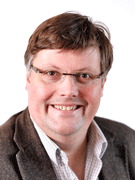Upcoming Events
- No events
Latest News
Tweets by@bcs_apsg
Please disable the ad-blocker in your browser to view the APSG Twitter newsfeed.
Past Event
High-Performance Computing for everyone - on finding a sweet spot between Productivity and Performance and Portability
| Date & Time | : | Thursday 8 March 2018, 6.00pm - 9.30pm |
| Venue | : | BCS, 1st Floor, The Davidson Building, 5 Southampton Street, London, WC2E 7HA (View on Google Maps) |
| Speaker | : | Professor Sven-Bodo Scholz |
Abstract
The availability of massively parallel systems as well as the need to make good use of them has never been as omnipresent as it is today. Many quickly evolving areas such as big data applications or machine learning are often only limited by the compute power that can be leveraged. The resulting need for domain experts to turn towards massively parallel, potentially heterogeneous computing results in new challenges for High-Performance Computing: Programmer productivity becomes crucial as well as the capability to run codes successfully on a range of hardware platforms.
This talk discusses some of the solutions that have been developed to tackle these challenges. At the example of the programming language SaC (Single Assignment C), the talk demonstrates how a good compromise between Performance, Productivity and Portability can be struck for many applications.
About the Speaker
 Professor Sven-Bodo Scholz received his Dr.rer.nat. and his German Habilitation from the University of Kiel in
1996 and 2004, respectively. From 2004 until 2011 he worked as Senior Lecturer and since 2008 as Reader at The University of
Hertfordshire. In 2011 he became Professor of Computer Science at Heriot-Watt University in Edinburgh, Scotland.
Professor Sven-Bodo Scholz received his Dr.rer.nat. and his German Habilitation from the University of Kiel in
1996 and 2004, respectively. From 2004 until 2011 he worked as Senior Lecturer and since 2008 as Reader at The University of
Hertfordshire. In 2011 he became Professor of Computer Science at Heriot-Watt University in Edinburgh, Scotland.
His research is driven by the desire to bridge the gap between high-productivity programming tools and high-performance heterogeneous many-core systems by means of compilation technology. Typical application areas range from multi-sensor robotics systems over big-data analytics to vision and computational science. Target systems range from embedded circuits over large clusters of GPU-accelerated systems into cloud infrastructures.
Most of his work on parallelising compiler technology is driven by the needs of industrial project partners such as Intel, AMD, Thales, SAP, Philips and others. Besides regular international dissemination in both, academia and industry, his work has led to several systems in the public domain.
